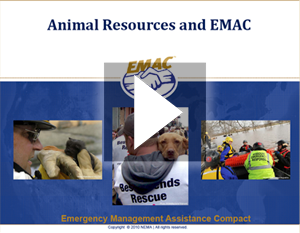Learn How to Prepare for Animal Response Thorough EMAC
The 2017 Hurricane Season was an excellent example of the impact of a single mission.
An Incident Management Team (IMT) to support animals and the agriculture infrastructure, which deployed to Puerto Rico in support of Hurricane Maria response, proved vital to helping save the Commonwealth’s heavily impacted agriculture economy, particularly the important dairy sector. Although a state resource, their work importantly involved coordinating efforts between the Puerto Rico Department of Agriculture, the United States Department of Agriculture (USDA), as well as the Puerto Rico Emergency Management Agency (PREMA).
The team from North Carolina deployed for two weeks at the beginning of October. A team had been requested because of the need to assess the current emergency and the overall situation with Puerto Rico agriculture, particularly with the obvious impacts on the dairy and poultry industries. Although a “short” IMT, this group was especially qualified to help assess the situation since it was a mix of both emergency managers and state-level agriculture personnel who worked in emergency programs, including Dr. Jimmy Tickel, a veterinarian with North Carolina’s Department of Agriculture and Consumer Services. Effectively, this team temporarily became the agriculture emergency support function (also known as ESF-11) for PREMA, and were based and incorporated into the workflow for the EOC for Puerto Rico. The team sent situation reports and recommendations as they assessed the issues with the agriculture industry, as well as participating in meetings to guide response. One of the team members was bilingual and served as the team’s interpreter.
Although impacts were heavy throughout Puerto Rico’s agriculture industries, including poultry, bananas, plantains, and coffee, it was quickly recognized that the dairy industry had to get up and running again as soon as possible. Dairy is the biggest agriculture industry in Puerto Rico, as those products are generally not imported but sourced locally, and is the economic backbone of many Puerto Rican communities. The staff provided the initial language for a USDA Assistance Grant for $12 million to assist dairy farmers with fuel, feed, veterinary, generator, and shelter needs for the 280 dairy farms across the Commonwealth, almost all of which could begin milking again if they could get the support needed.
This group also worked closely with the PR Department of Agriculture, and the team has noted the impressive record keeping of the Department on agriculture industry expenditures. The two groups worked closely to develop a plan for a donations-based voucher program to support the beef, small ruminant, and independent poultry operations not covered by the dairy support program. The group also coordinated with animal nongovernmental organizations (NGOs) and agriculture industry groups to communicate resource needs and share situational awareness in order to facilitate NGO resource support to the incident. As continuity of operations in Puerto Rico improved, the IMT was able to work with department staff to take back the ESF-11 responsibilities after their departure.
The team worked closely with USDA staff, including Anne McCann, Director, Emergency Management, Safety and Occupational Health Programs for USDA’s Animal Care program. McCann stated, “Bringing a joint Agriculture/Emergency Management team to identify, prioritize, and articulate animal and agriculture issues and find solutions has been incredibly important, and has helped save the dairy industry there.” She noted the blended IMT, with depth of knowledge and effective working relationships across agriculture and emergency management was a huge part of its success. The grant request to USDA also helped encourage the appointment of a representative from the U.S. Secretary of Agriculture to work “on the ground” in Puerto Rico and the U.S. Virgin Islands to address the unique challenges faced by the agriculture community in the Caribbean as a result of Hurricanes Irma and Maria.
Additionally, this IMT helped the citizens of Puerto Rico in other ways, such as coordinating with The Humane Society of the United States to provide an aerial agriculture assessment, providing guidance to FEMA operations on a program for companion animal vaccinations (involving local veterinarians and public health sector personnel), and working with local agriculture companies to help their communities recover.
Thanks very much to Dr. James Tickel and Anneliese McCann at the USDA for their contributions to this article and their hard work to assist others in disaster recovery.
EMAC's Benefits
- Fast and Flexible Assistance
- All Hazards - All Disciplines
- Resources deploy through the state emergency management agencies of their respective states allowing for a coordinated deployment
- Deployments are coordinated with the federal response to avoid duplication and overlap
Learn more about EMAC's Legal Protections by selecting from one of the options, below.



